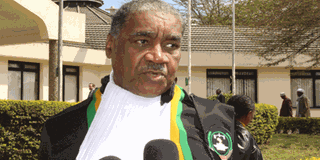Ramadhani seeks Africa court review

Judge Augustino Ramadhani in Arusha. Tanzania’s former Chief Justice is seeking to revoke the law requiring African heads of state to make a declaration accepting the jurisdiction of the court. PHOTO| PATTY MAGUBIRA
What you need to know:
“We cannot deal with applications from Egypt until that country ratifies the protocol and declaration on the establishment of this honourable court,”
Arusha. The African Court on Human and Peoples’ Rights (AfCHPR) will ask African Union heads of state to revoke the law requiring them to make a declaration accepting the jurisdiction of the judicial organ.
According to Article 5 of the protocol establishing it and its rule 33, the court may receive complaints or applications submitted to it by the African Commission of Human and People’s Rights (AfCHPR), or state parties, or the continent’s intergovernmental organisations.
Non-Governmental Organisations (NGOs) with observer status before the AfCHPR and individuals from states which have made a declaration accepting the court’s jurisdiction can also institute cases directly before the court.
But barely 27 out of 54 African states have to date ratified the protocol of which only seven -- Tanzania, Burkina Faso, Ghana, Ivory Coast, Mali, Malawi and Rwanda -- have made the declaration to allow their citizens and NGOs to file their applications in it.
The AfCHPR newly elected third President, Judge Augustino Ramadhani, said unless law stipulated in the Protocol establishing the court was amended, the doors would remain closed to ordinary Africans wishing to access the court.
He cited a Nigerian lawyer who had unsuccessfully challenged the Article simply because his country had not made a declaration to allow its people to file applications at the court.
Few months ago the court also refused to receive two applications filed by Egyptian activists following their country’s failure to ratify the court’s protocol and make the declaration.
“Our hands are tied,” the Court Registrar, Mr Robert Eno, was quoted as saying then. “We cannot deal with applications from Egypt until that country ratifies the protocol and declaration on the establishment of this honourable court,” he explained.
The first application was filed on June 16, this year, by five applicants against a handful of Egyptian officials, including Abdel-Fattah al-Sisi, former army chief and incumbent President; Ahmed al-Tayyib, grand imam of Egypt’s Al-Azhar; Coptic Orthodox Pope Tawadros II; Interior Minister Mohamed Ibrahim; Adly Mansour, a former interim President; and Abdel-Maguid Mahmoud, a former Attorney-General.
A second application – targeting the same officials – was filed on the same day by four other Egyptians. Both applications were filed with the court’s registry by lawyer Mostafa Mutawalli.




